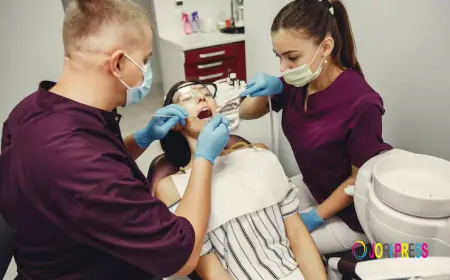The Evolving Landscape of Nursing: A Comprehensive Overview
The Evolving Landscape of Nursing: A Comprehensive Overview

Nursing, as both a profession and a discipline, stands at the intersection of science, compassion, and patient advocacy. Over the years, it has evolved from a role defined by basic bedside care into a multifaceted career that integrates leadership, research, policy-making, and advanced clinical expertise. In modern healthcare systems, nurses are vital contributors to quality improvement, safety initiatives, and collaborative care models. As education systems adapt to the changing nature of nursing, flexible academic options like Capella Flexpath Assessments have emerged, giving nurses more control over their educational journeys while meeting industry standards for skill and competence.
Historical Context and Transformation of Nursing
To understand the current state of nursing, it’s important to appreciate its historical trajectory. The profession has its roots in caregiving practices passed down through families and religious orders. Florence Nightingale's reform of sanitation and organization in hospitals during the 19th century is often cited as a turning point in professionalizing nursing.
Over time, nursing education shifted from apprenticeships and hospital-based training to university-level programs that combine theoretical instruction with clinical application. The introduction of bachelor's, master's, and doctoral programs in nursing has expanded the role of nurses in specialized clinical practice, research, and healthcare administration.
Nursing Roles in Today’s Healthcare System
Today, nurses serve in diverse roles, from staff nurses in hospital wards to nurse practitioners managing primary care. Advanced Practice Registered Nurses (APRNs) such as Nurse Anesthetists, Nurse Midwives, and Clinical Nurse Specialists hold specialized knowledge and often operate with significant autonomy.
Community health nurses, school nurses, and public health professionals address broader population needs, including immunization programs, disease surveillance, and health promotion campaigns. Meanwhile, nurse informaticists work at the nexus of healthcare and technology, managing electronic health records and patient data systems.
This expanding role requires nurses to be both clinically adept and organizationally strategic. They are expected to collaborate with interdisciplinary teams, communicate effectively with patients and families, and act as advocates within increasingly complex healthcare environments.
Education and Lifelong Learning
Nursing education is foundational to a nurse's ability to provide safe, evidence-based, and ethical care. Entry-level qualifications vary by country and institution, but the Bachelor of Science in Nursing (BSN) is becoming the standard in many healthcare settings. The BSN prepares nurses not only for clinical roles but also for leadership, policy, and research involvement.
Lifelong learning is an ethical and professional obligation in nursing. Continuing education allows nurses to remain updated on new medical protocols, pharmacology, technology, and legal responsibilities. It also ensures compliance with licensure renewal requirements and encourages advancement in career specialization.
Competency-based learning models, such as online programs and personalized academic pathways, accommodate working nurses who require flexibility. These models recognize that nurses bring prior experience and skills to their learning environments, and they promote the demonstration of competencies over time spent in traditional classrooms.
The Centrality of Evidence-Based Practice
Evidence-Based Practice (EBP) has revolutionized modern nursing. By integrating the best available research evidence with clinical expertise and patient values, EBP ensures that nursing interventions are effective, efficient, and patient-centered.
EBP is not limited to the implementation of standardized protocols. It includes the ability to appraise research, apply findings in clinical contexts, and assess outcomes critically. As such, nursing education programs place a heavy emphasis on research literacy, data analysis, and reflective practice.
Institutions use case-based learning, clinical simulations, and scenario analyses to teach students how to apply theoretical knowledge to real-world decision-making. For instance, in academic exercises like nurs fpx 4045 assessment 1, students are required to evaluate patient scenarios, identify appropriate nursing interventions, and justify decisions using current research.
Communication and Teamwork in Patient Care
One of the most important soft skills in nursing is communication. Nurses communicate with patients, families, physicians, therapists, and administrative staff. They must be able to listen actively, convey complex information clearly, and manage emotional interactions with empathy and professionalism.
Effective communication also underpins patient safety. Handoff reports, care documentation, and verbal instructions must be accurate and complete to avoid medical errors. Communication failures are one of the leading causes of adverse patient events, making this skill an essential part of nursing curricula and clinical training.
In team-based care models, collaboration is equally important. Nurses coordinate with social workers, pharmacists, and specialists to develop integrated care plans. This collaboration is especially critical in high-acuity settings such as ICUs, emergency rooms, and surgical departments, where timeliness and coordination can affect patient outcomes directly.
Ethics, Advocacy, and Legal Considerations
Ethical considerations are embedded in nearly every nursing decision. Nurses are tasked with protecting patient autonomy, ensuring informed consent, and advocating for vulnerable populations. Ethical dilemmas often arise in situations involving end-of-life care, pain management, or resource allocation.
Nurses are guided by professional codes of ethics, such as those issued by the American Nurses Association (ANA), which emphasize principles like beneficence, nonmaleficence, justice, and fidelity. These principles help nurses navigate complex moral decisions while maintaining accountability and professionalism.
On the legal front, nurses must understand their scope of practice, mandatory reporting laws, and institutional protocols. Missteps can result in malpractice claims or license revocation. Therefore, academic assignments and assessments frequently include legal and ethical components that mirror the responsibilities nurses carry in real clinical environments.
Technological Advancements and Their Impact on Nursing
The integration of technology in healthcare has reshaped the nursing profession. Electronic Health Records (EHRs), telehealth platforms, and diagnostic tools have become part of daily nursing practice. Nurses are expected to possess digital literacy, data security awareness, and an ability to use informatics tools for documentation and patient education.
Nursing programs increasingly offer training in health informatics and technology management. Tools like patient simulators, virtual reality, and mobile learning applications enhance student engagement and support competency development. Assessments such as nurs fpx 4065 assessment 2 may require learners to incorporate technological tools into clinical decision-making, demonstrating readiness for tech-integrated practice environments.
Cultural Competence and Health Equity
In today’s multicultural societies, nurses must be culturally competent. This includes understanding how cultural backgrounds influence health beliefs, communication styles, and attitudes toward illness and treatment. Cultural competence also helps in building trust, which is critical to effective care delivery.
Nurses must also be attuned to the social determinants of health (SDOH), such as housing, education, employment, and food security. These non-medical factors can significantly influence health outcomes. Nurses who understand these variables can make appropriate referrals, design patient-specific interventions, and participate in community outreach.
Equity in healthcare is a growing concern. Nurses play a crucial role in recognizing disparities and advocating for inclusive policies. Whether working in rural clinics or urban hospitals, nurses must ensure that care is accessible and equitable across all populations.
Mental Health and Professional Resilience
The demanding nature of nursing makes it a high-risk profession for stress, burnout, and compassion fatigue. Nurses frequently deal with traumatic situations, terminal illness, and the emotional toll of caring for others. Maintaining mental health and building resilience is therefore essential for sustaining a nursing career.
Many organizations now offer wellness programs, peer support networks, and mental health resources for nurses. In academic environments, resilience training, mindfulness exercises, and reflective journaling are often included in the curriculum to prepare students for the emotional challenges of the profession.
Self-care is also emphasized, not just for the benefit of the nurse, but for the safety of patients. A nurse who is emotionally exhausted is less likely to make sound clinical decisions, communicate effectively, or engage empathetically with patients.
Conclusion
The nursing profession continues to evolve in complexity and scope, adapting to the changing needs of patients, advances in technology, and shifts in healthcare delivery. Nurses today are educators, advocates, researchers, and leaders—all while providing compassionate and competent care to individuals and communities.
Reflecting this comprehensive development is nurs fpx 4015 assessment 4, which emphasizes advanced clinical judgment and integration of interdisciplinary concepts. Such assessments reinforce the idea that nursing is a lifelong commitment to learning, growth, and human-centered care—a commitment that remains as vital today as it ever has been.
For more info:
Advancing Nursing Practice Through Assessment and Competency-Based Education
Adapting to Competency-Based Learning Through FlexPath Assessments
Strengthening Nursing Competence Through Assessment-Driven Education
What's Your Reaction?
 Like
0
Like
0
 Dislike
0
Dislike
0
 Love
0
Love
0
 Funny
0
Funny
0
 Angry
0
Angry
0
 Sad
0
Sad
0
 Wow
0
Wow
0
















































